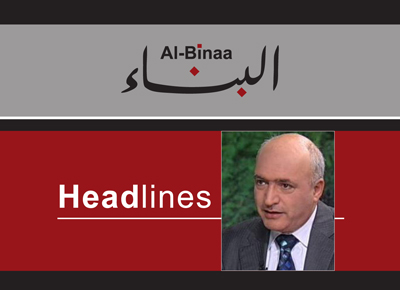American-French-Saudi Push Sweeps Parliamentary Blocs in Support of Army Commander’s Candidacy / Frangieh Withdraws in Favor of Aoun, While the Free Patriotic Movement Swims Against the Current, and Hardan Calls for Consensus on the Presidency
Aoun’s Election Hinges on the Dual Bloc as Consensus Remains Incomplete… Today’s Answer Lies in the Ballot Box

January 09, 2025
The political editor wrote
The American-French-Saudi trio threw its full weight behind the presidential race as Qatari influence waned, turning yesterday into a heated day of political maneuvering. Positions shifted among parliamentary blocs and independent MPs as all elements of influence were mobilised to gather 86 votes for the election of Army Commander General Joseph Aoun as president – without the support of the national dual bloc, represented by the Development and Liberation and Loyalty to the Resistance blocs. The dual bloc had freed its allies from any commitments, prompting MPs and blocs previously aligned with its presidential choice to join the wave supporting Aoun.
MP Faisal Karami, speaking for the National Accord Bloc, announced his support for Aoun’s candidacy. Former Minister Suleiman Frangieh withdrew from the race, endorsing Aoun, as did former Minister Ziad Baroud, who had secured the support of six MPs. Meanwhile, some independent MPs, led by MP Melhem Khalaf, opposed Aoun’s election, citing it as an unacceptable constitutional violation. The Free Patriotic Movement continued to swim against the current, reaffirming its rejection of constitutional breaches. Conversely, Asaad Hardan, leader of the Syrian Social Nationalist Party, advocated for national consensus as an urgent necessity to resolve the presidential stalemate.
The political and electoral process has now narrowed its focus on the dual bloc’s final position, which has pledged a unified and consistent vote while insisting on the importance of reaching consensus, which remains elusive.
Comparing Aoun’s candidacy to the election of Michel Suleiman, a source following the electoral developments noted that Suleiman’s presidency was agreed upon as part of a Lebanese consensus brokered during Doha meetings under Qatari sponsorship. The agreement included a new electoral law, a framework for the new government, and provisions for a blocking third. Today, the issues requiring consensus are even more critical. These include questions of national sovereignty, confronting Israeli aggression, fully implementing Resolution 1701 – particularly the withdrawal from the occupied Shebaa Farms – ensuring Lebanon’s rights to its oil resources, resuming their investment, and rebuilding after the occupation’s war on Lebanon 14 months ago. Additionally, there is a need to complete the Taif Agreement’s reforms, especially its long-pending provisions.
The source argued that if the international and Arab external actors wish to substitute themselves for a Lebanese faction in crafting consensus while rallying this faction to elect Aoun, then these external parties must also answer these pressing questions to finalise the presidential election and conclude the entitlement.



